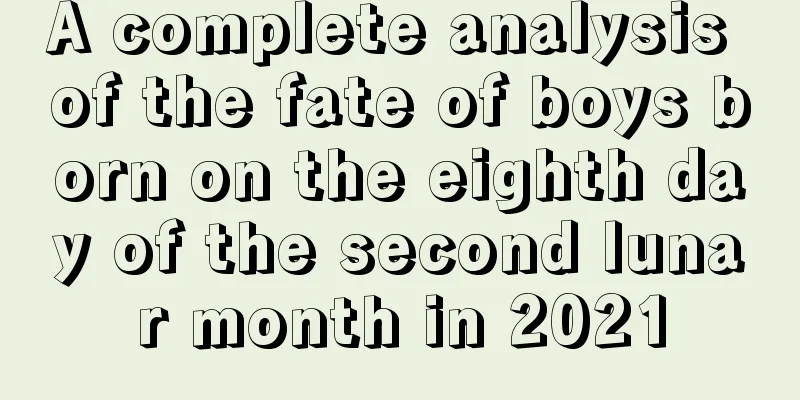Can I go back to my parents’ home for the Dragon Boat Festival in 2020? Why do we tie five-colored silk threads during the Dragon Boat Festival?

Introduction: The Dragon Boat Festival can also be auspicious or inauspicious, so can I go back to my parents' home for the Dragon Boat Festival in 2020? Why do we tie five-colored silk threads on the Dragon Boat Festival? The fifth month of the lunar calendar belongs to midsummer, when everything is growing at its peak. What should we pay attention to in the fifth month of the lunar calendar in 2020? Let’s take a look at the special topic of May 2020 on the Shuimoxiansheng website.Can I go back to my parents’ home for the Dragon Boat Festival in 2020?——From the content of the 2020 Dragon Boat Festival lunar calendar:Lunar calendar: May 5, 2020 Gregorian calendar: June 25, 2020, Thursday, Cancer [Today is suitable according to the old almanac] [Do not use it for important events on Yang Gong's taboo day] Pray for blessings, get married, set up beds, build stoves, offer sacrifices, seek offspring, seek wealth, bury, accept betrothal gifts, remove construction, break ground, take up office, erect pillars, put up beams, plant meridians, build houses, dig wells, and catch [Today is taboo according to the old almanac] [Do not use it for important events on Yang Gong's taboo day] open the market, establish securities, receive wealth, ship goods, receive livestock, move into houses, separate, produce fire, travel, and open positions . Summary: Since today is Yang Gong's taboo day, it is not suitable to go to your mother's house on the Dragon Boat Festival in 2020! ——From the perspective of folk traditions and customs: One of the customs of the Dragon Boat Festival is called Guining, which means returning to one’s parents’ home. In ancient times, after a daughter got married, she would live in her husband's home for a long time and rarely saw her parents. The Dragon Boat Festival is her chance to go home and visit her parents. So people also call the Dragon Boat Festival "Daughters' Day". Although everyone is going back to their parents' home, the ways of doing so vary from place to place. Beijing: "Wan Shu Miscellaneous Notes" by Chen Bang of the Ming Dynasty recorded the customs of Beijing at that time: from the first to the fifth day of the fifth month of the lunar calendar, people dressed up their little girls to the utmost. Married daughters also return to their parents' home during this period. Suzhou: Women have to bring their children under one year old back to their parents' home during the Dragon Boat Festival. This is called "hiding from the Wu", which means letting the children avoid the evil spirits of the Dragon Boat Festival. Hubei: There is a custom that mothers take their children to their grandmother’s house to “hide from the Dragon Boat Festival”. This is an important purpose for women to return to their parents' home, but of course the more important purpose is social interaction. In Zigui, Hubei, there is a saying among the people that "The Dragon Boat Festival is more important than the Spring Festival, and girls return to their parents' homes." The Dragon Boat Festival is even more grand than the Spring Festival. Married women have to bring their husbands and children back to their parents' homes to pay homage to their parents. They may walk, ride in sedan chairs, ride on horses, or take boats back to their parents' home to reunite with their family members and celebrate the Dragon Boat Festival. The daughter's parents have to prepare food and wine and invite friends and relatives to spend a happy day together. Why do we tie five-colored silk threads during the Dragon Boat Festival?In traditional Chinese culture, the five colors of "blue, red, white, black and yellow" that symbolize the five directions and five elements are regarded as auspicious colors. Tying five-colored silk threads on arms was once a popular custom during the Dragon Boat Festival.It was passed down to later generations and developed into many kinds of beautiful ornaments such as longevity threads, longevity locks, sachets, etc. The production volume also became more and more refined, becoming a unique folk art of the Dragon Boat Festival. On the Dragon Boat Festival, children tie five-colored silk threads on their wrists and ankles to ward off evil spirits. According to traditional custom, people twist thick silk threads of red, green, yellow, white and black into colorful ropes and tie them around children's arms or necks. They start tying them on May 5th and keep them until the birthday of "Seventh Mother" on Chinese Valentine's Day, when they are then taken off and burned along with gold paper. There is also a saying that on the first rainy day after the Dragon Boat Festival, cutting the colorful thread and throwing it into the rain means letting the river water wash away the plague and disease. It is said that it can drive away evil spirits, ward off disasters and bring good luck for the year. Is your fate with him/her destined? Will you be happy together? For advance prediction of fate, please click on the "Excellent Calculation" below . I wish you a smooth relationship and a happy life! |
<<: Is May 29th of the lunar calendar 2020 a good day?
Recommend
Is it good for a boy born on December 19th of the lunar calendar in 2018 to have a good fate?
Is it good for a boy born on December 19th of the ...
Is it a good time to travel in June of the lunar calendar in 2022? Which day is suitable for traveling far away?
The sixth month of the lunar calendar is the last ...
What are the benefits of eating millet during the Lesser Heat? What solar term does the Lesser Heat belong to?
Introduction: Lesser Heat is one of the 24 solar t...
What do people do during the Lesser Heat? What are the climate characteristics?
Lesser Heat is the beginning of the dog days of su...
Is the sixth day of the second lunar month in 2022 an auspicious day? Can it be renovated?
Every day is different in terms of good and bad. S...
The fate of boys born on June 28th of the lunar calendar in 2021
The fate of a boy born at different times is compl...
What does it mean to die in the twelfth lunar month? Is it good for an old man to die in the twelfth lunar month?
Birth, aging, sickness and death are the laws of n...
What is the date like on the second day of the first lunar month in 2018? Is it suitable for burning incense and praying?
Introduction: Burning incense and praying for bles...
What should I pay attention to when placing the fish tank? Is it good to see a fish tank when you open the door?
Introduction: Fish tanks have become a common hous...
Feng Shui Tips for Car Owners
Introduction: Chinese people firmly believe in Fe...
When is the Winter Solstice in 2018? What should we eat on it?
What is the month, day, and time of the winter sol...
Details of the auspicious and inauspicious times on the 29th day of the eighth lunar month in 2019!
Days can be auspicious or inauspicious, and each ...
What is the date of the Spring Equinox in 2021? What does the Spring Equinox mean?
The time of the Spring Equinox festival changes ev...
Can I move to a new home on the fourth day of the second lunar month in 2020? Is it a good idea to move to a new home?
The fourth day of February in 2020 is the fourth ...
Can I get married on the 29th day of the seventh lunar month in 2018?
July has beautiful names such as Qiao Yue, Gua Yu...









